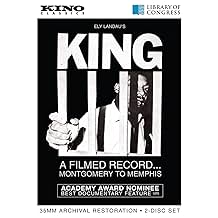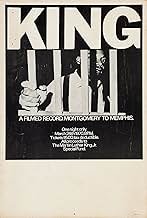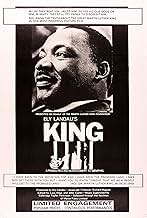King: una testimonianza filmata... da montgomery a memphis
Titolo originale: King: A Filmed Record... Montgomery to Memphis
- 1969
- 3h 5min
VALUTAZIONE IMDb
8,2/10
678
LA TUA VALUTAZIONE
Aggiungi una trama nella tua linguaFollows Martin Luther King's life and decades-long civil rights activism.Follows Martin Luther King's life and decades-long civil rights activism.Follows Martin Luther King's life and decades-long civil rights activism.
- Regia
- Sceneggiatura
- Star
- Candidato a 1 Oscar
- 1 vittoria e 1 candidatura in totale
Martin Luther King
- Self
- (filmato d'archivio)
Ralph Abernathy
- Self
- (filmato d'archivio)
James Baldwin
- Self
- (filmato d'archivio)
Tony Bennett
- Self
- (filmato d'archivio)
Leonard Bernstein
- Self
- (filmato d'archivio)
Marlon Brando
- Self
- (filmato d'archivio)
H. Rap Brown
- Self
- (filmato d'archivio)
Recensioni in evidenza
The version of this documentary I saw did not contain any of the celebrity "bridges" that Maltin mentioned in his review. The version I saw, ran only 103 minutes (as to the 185 of Maltin's version) and contained only archival footage of Dr. King's career from 1955 to 1968. This version is a pure video diary of King's speeches and marches. It contains amazingly powerful footage of the nonviolent protests and the final moments of King's life.
11/18/17. A bit on the long side, but at least you get the chance to listen to the entire "I have a dream." No denying that King was a force to be reckoned with. His oratory style is reminiscent of the fiery preacher of past, and still quite effective in inspiring its listeners to bigger and better things.
10virek213
If ever there were a documentary that could be deemed absolute required viewing, whether in classrooms or in homes, it is KING: A FILMED RECORD
MONTGOMERY TO MEMPHIS. Shown in only a handful of theaters on one single day (March 24, 1970), and released on video numerous times over the years in condensed form, this monumental documentary, some fourteen years after it was entered into the National Film Registry, is back in release on DVD in the form that people who got to see it in 1970 originally saw it, in its uncut length of just slightly over three hours.
Put together by filmmakers Sidney Lumet and Joseph L. Mankiewicz and producer Ely Landau, KING: A FILMED RECORD looks at the place that the Rev. Dr. Martin Luther King Jr. holds in American history. Having gone from a relatively unknown preacher in the early 1950s to national prominence as a result of Rosa Parks' breaking the segregation barrier on transit buses in Montgomery Alabama, King became one of the great figures of our history by making it his mission in life to see that all men, women, and children in America would be judged by what's in their heart and not by what their skin color was. In the original uncut form that had gotten it an Oscar nomination for Best Documentary Feature in 1970 (it lost to WOODSTOCK), KING: A FILMED RECORD looks at all the important moments in Dr. King's non-violent revolution that would forever change the American landscape, even if it didn't change everybody's perceptions of those different from themselves. He fought non-violently against racist governors like George Wallace, bigoted police chiefs like Birmingham, Alabama's infamous Bill Connor, led the march on Selma, and managed to get long-stalled civil rights and voting rights legislation through Congress onto the books through the signature of then-president Lyndon Johnson . All of his most important speeches are included in their full, unexpurgated form here, including the monumental "I Have A Dream" speech he made during the March on Washington of August 28, 1963, and his final "I've Been To The Mountaintop" speech he made in Memphis on the night of April 3, 1968, the night before he was felled by an assassin's bullet.
We also see how tough the struggle could be, what with the murder of Malcolm X, the formation of militaristic groups like the Black Panthers, the urban rioting, White resistance in the South, and, perhaps most important of all, the war in Vietnam, which would eventually destroy Johnson's achievements as a crusader alongside King for civil rights and also be responsible for sending thousands of poor and working-class young men, white and Negro alike, to their deaths. These are important reminders of where America was during the 1960s, how far it has come since then with the election of our first African-American president in Barack Obama, and how, in many other ways, we still have a long way to go towards full acceptance of difference and diversity in America.
All of this makes KING:A FILMED RECORD an epic film to match any that Hollywood itself ever did, but that is because the real-life story it tells is a true American epic of modern times. Martin Luther King was one of the greatest American citizens who ever lived, and this documentary ensures that his legacy will never be forgotten.
Put together by filmmakers Sidney Lumet and Joseph L. Mankiewicz and producer Ely Landau, KING: A FILMED RECORD looks at the place that the Rev. Dr. Martin Luther King Jr. holds in American history. Having gone from a relatively unknown preacher in the early 1950s to national prominence as a result of Rosa Parks' breaking the segregation barrier on transit buses in Montgomery Alabama, King became one of the great figures of our history by making it his mission in life to see that all men, women, and children in America would be judged by what's in their heart and not by what their skin color was. In the original uncut form that had gotten it an Oscar nomination for Best Documentary Feature in 1970 (it lost to WOODSTOCK), KING: A FILMED RECORD looks at all the important moments in Dr. King's non-violent revolution that would forever change the American landscape, even if it didn't change everybody's perceptions of those different from themselves. He fought non-violently against racist governors like George Wallace, bigoted police chiefs like Birmingham, Alabama's infamous Bill Connor, led the march on Selma, and managed to get long-stalled civil rights and voting rights legislation through Congress onto the books through the signature of then-president Lyndon Johnson . All of his most important speeches are included in their full, unexpurgated form here, including the monumental "I Have A Dream" speech he made during the March on Washington of August 28, 1963, and his final "I've Been To The Mountaintop" speech he made in Memphis on the night of April 3, 1968, the night before he was felled by an assassin's bullet.
We also see how tough the struggle could be, what with the murder of Malcolm X, the formation of militaristic groups like the Black Panthers, the urban rioting, White resistance in the South, and, perhaps most important of all, the war in Vietnam, which would eventually destroy Johnson's achievements as a crusader alongside King for civil rights and also be responsible for sending thousands of poor and working-class young men, white and Negro alike, to their deaths. These are important reminders of where America was during the 1960s, how far it has come since then with the election of our first African-American president in Barack Obama, and how, in many other ways, we still have a long way to go towards full acceptance of difference and diversity in America.
All of this makes KING:A FILMED RECORD an epic film to match any that Hollywood itself ever did, but that is because the real-life story it tells is a true American epic of modern times. Martin Luther King was one of the greatest American citizens who ever lived, and this documentary ensures that his legacy will never be forgotten.
I was able to catch about the 2nd half of this on cable recently. The remnants of the divide between the North and South dating back to the civil war were played out as MLK continued his crusade in Alabama. This was a gripping account of the small victories that he rallied the public to empower themselves. I found it more engrossing than other MLK documentaries because it examined the battles more closely. But then, interspersed within this footage presented without narration, the film breaks to a stage with minimal theatrical backdrops. Periodically, a famous actor will give a 2 -3 minute famous speech from a notable source. These quotes are not given any introduction or provided any titles to inform the audience. The pieces I saw in the last part were Charlton Heston, James Earl Jones, and a few others I didn't recognise. After reading the trivia notes about this film on IMDb, I understand this was a fund raising film for a charitable organisation. That explains the appearances by the big name stars to get people to pay to see the film. On the other hand, it extends the film running time. I found myself impatient, waiting for the film to return to the shocking footage of churches being bombed, killing children. But on the other hand, seeing James Earl Jones give a powerful performance complimented the film.
Production wise, there were moments of choppy editing, but letting the footage and MLK's words speak for them-self is very compelling.
Production wise, there were moments of choppy editing, but letting the footage and MLK's words speak for them-self is very compelling.
10greg-253
After watching 103 minute edited version (the only celeb commentary by Harry Belefonte), one has to wonder why this film isn't more available to the general public. It is by far, one of the best documentary efforts to chronicle Martin Luther King Jr. as he helped push the civil rights movement forward into the public consciousness.
What makes this film special (in its condensed version) is the plainly laid out - but thoughtfully edited - chronology of Dr. King's various actions, speeches - and the public response. Other than Belafonte's opening statement, the film has no narration - which gives it an urgency. This is punctuated by King's powerful oratory (including the entire I Have A Dream speech...and segments of many others), along with footage of demonstrations, marches and material that is often hard to watch due to the racially charged violence.
Still, it is a potent reminder of our history - and should be seen by all.
What makes this film special (in its condensed version) is the plainly laid out - but thoughtfully edited - chronology of Dr. King's various actions, speeches - and the public response. Other than Belafonte's opening statement, the film has no narration - which gives it an urgency. This is punctuated by King's powerful oratory (including the entire I Have A Dream speech...and segments of many others), along with footage of demonstrations, marches and material that is often hard to watch due to the racially charged violence.
Still, it is a potent reminder of our history - and should be seen by all.
Lo sapevi?
- QuizThis film originally was shown at theaters as a "one-time-only" event on 24 March 1970 and ran 3 hours and 5 minutes. The proceeds from the $5 admission price were donated to the Dr. Martin Luther King Jr. Special Fund. It was later shown on US television, unedited and with limited interruption.
- Versioni alternativeA second version, edited down to 103 minutes, was released onto videotape. It is missing the celebrety narratives and an opening montage of clips of militant black leaders with violent rhetoric contrasting to clips of Dr. King's non-violent messages, but includes the original introduction by Harry Belefonte, and consists entirely of newsreel footage.
- ConnessioniFeatured in Is That Black Enough for You?!? (2022)
I più visti
Accedi per valutare e creare un elenco di titoli salvati per ottenere consigli personalizzati
Dettagli
- Data di uscita
- Paese di origine
- Lingua
- Celebre anche come
- King: A Filmed Record... Montgomery to Memphis
- Luoghi delle riprese
- Azienda produttrice
- Vedi altri crediti dell’azienda su IMDbPro
- Tempo di esecuzione3 ore 5 minuti
- Colore
- Mix di suoni
- Proporzioni
- 1.37 : 1
Contribuisci a questa pagina
Suggerisci una modifica o aggiungi i contenuti mancanti

Divario superiore
By what name was King: una testimonianza filmata... da montgomery a memphis (1969) officially released in India in English?
Rispondi




































